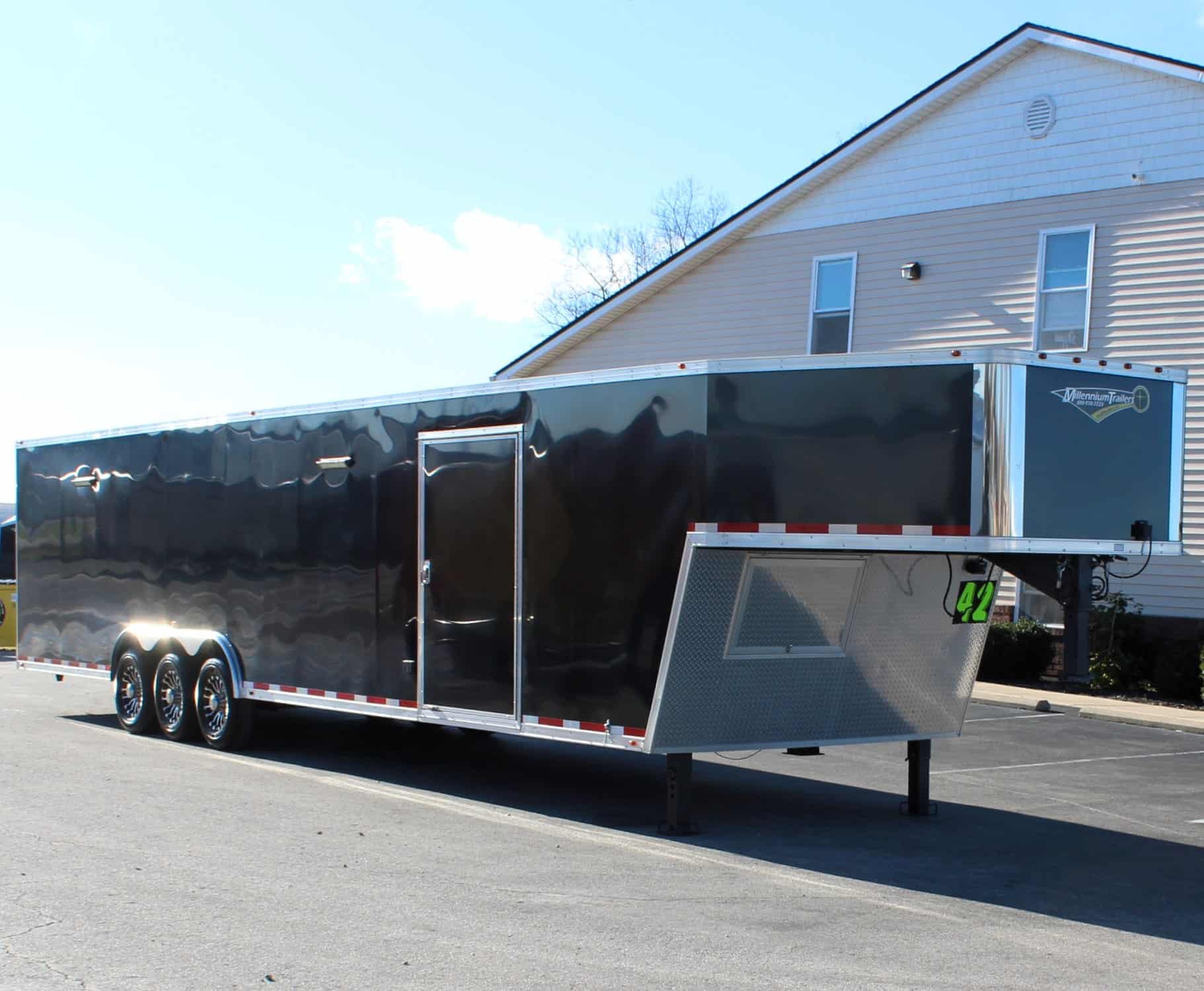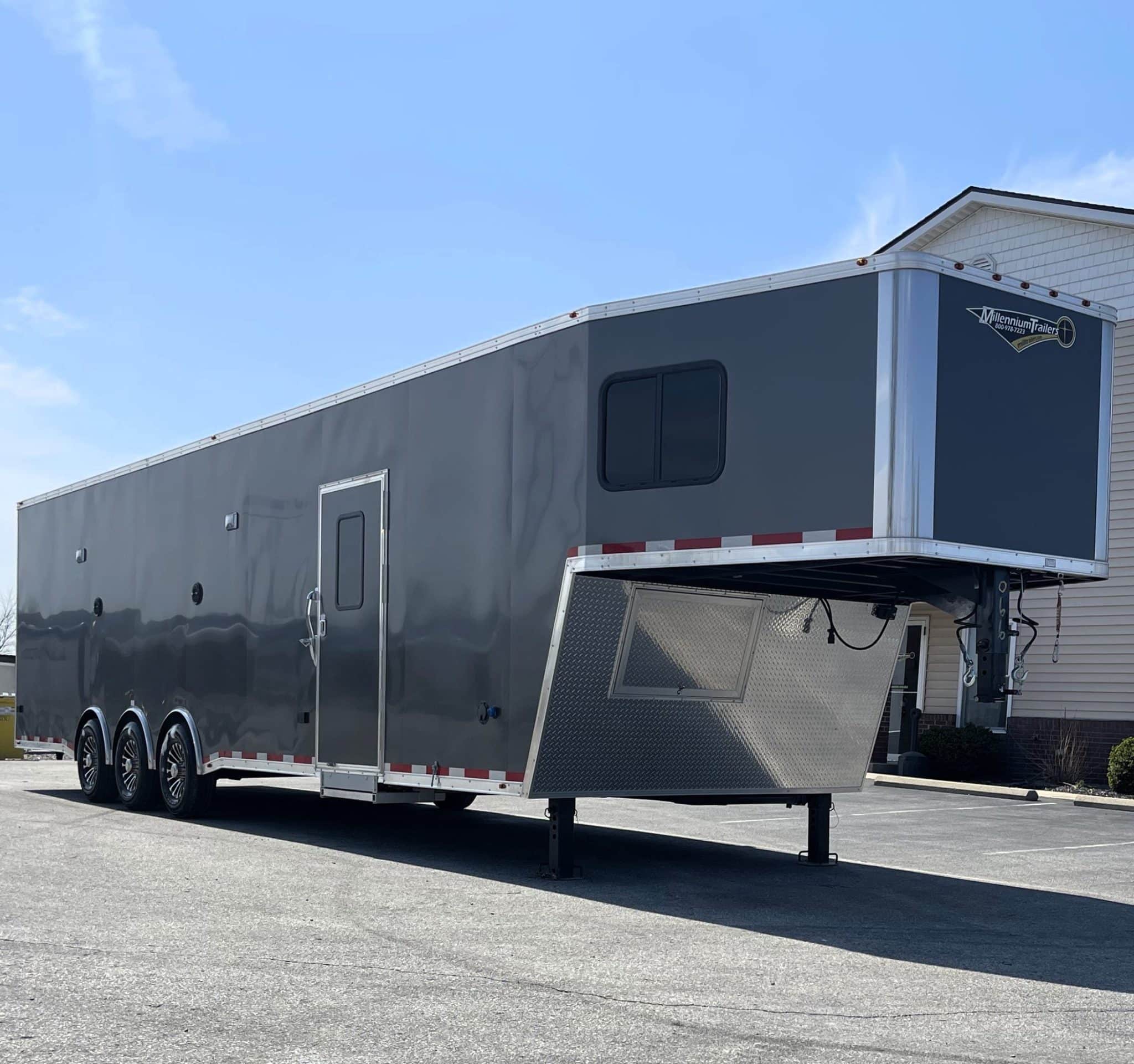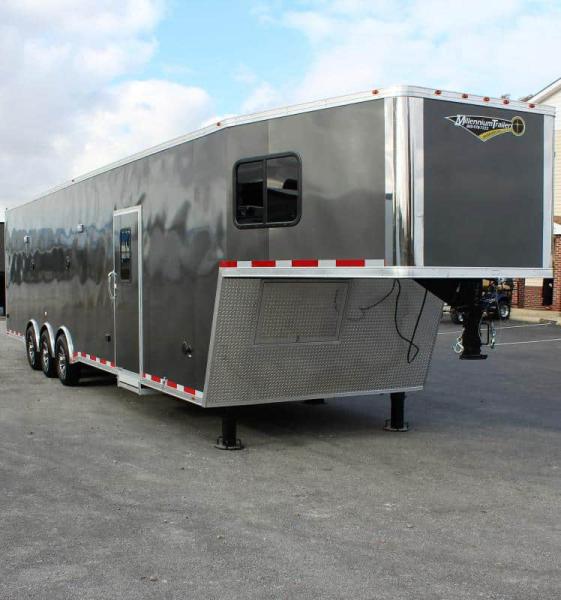Designed to handle a wide range of hauling tasks, gooseneck trailers are a staple of the haulage industry – as evidenced by how frequently you will see them on our highways. Adept at moving heavy loads such as farm machinery, large equipment, and even livestock, their unique setup is instantly recognizable.
One of the many reasons people prefer using a gooseneck trailer is because of its general stability on the road. But what other reasons might you select a gooseneck trailer, and are there any downsides? In this guide, we will look at the pros and cons of gooseneck trailers and help you decide if it is the right choice for you and your hauling requirements.
A gooseneck trailer is unique from other forms of trailers owing to its unique hitching system. Instead of attaching to a vehicle’s rear bumper (like a standard cargo trailer, for example), it connects through a ball hitch installed in the bed of a pickup truck.
This type of setup allows for better stability and balance when carrying heavy loads, which is why they are commonly chosen for tasks like hauling large equipment, livestock, and other weighty cargo.
The hitch connection over the rear axle provides better weight distribution compared to other trailers. This means the truck and trailer move as one unit, making it easier to handle sharp turns and navigate tough terrain. In addition to its strong towing potential, the benefits of a gooseneck trailer include smoother handling on the road, reduced trailer sway, and more general control over your load.
When compared to bumper pull trailers, gooseneck trailers are also preferred for their increased towing capacity. These trailers can carry more weight without compromising stability. Because of this, gooseneck trailers are often used for transporting heavy-duty materials and equipment over longer distances, making them a go-to option for those who need reliable towing for big jobs.
However, while they have plenty of advantages in terms of towing capacity and balance, there are also a few pros and cons of gooseneck trailers to consider – we will get to those. For now, let’s take a look at the plus points.
There are several types of gooseneck trailers, each designed for specific purposes. Gooseneck car hauler trailers, for example, are designed to transport vehicles safely and feature lower decks for hassle-free loading and unloading.
Another popular option is the gooseneck trailer with living quarters, which is commonly used by people traveling long distances or for recreational purposes, such as horse trailers with built-in accommodations. These trailers can include full amenities like kitchens, bathrooms, and sleeping areas.
Gooseneck cargo trailers provide a large, enclosed space to transport goods safely and securely. They often feature additional storage options (and sometimes quite flashy custom builds) for unique hauling objectives.
With variations ranging from basic flatbeds to fully equipped living spaces, gooseneck trailers are a flexible choice, depending on what you need to haul and how you prefer to travel.

Gooseneck trailers offer a wide range of practical benefits for anyone needing to haul heavy loads. One of the most important benefits of a gooseneck trailer is reliable stability; because the hitch connects directly over the truck’s rear axle, the weight is distributed far more evenly than with other trailer types, greatly reducing the chance of trailer sway.
This feature is especially useful when driving at higher speeds or hitting sharp turns, as the load remains nice and steady. Ask anyone who has ever experienced heavy sway, and they will tell you it is a phenomenon best avoided.
Among the various benefits of a gooseneck trailer, many would argue its increased towing capacity is equally as important as stability. These trailers are built to handle far heavier loads than most bumper pull trailers, with some models capable of carrying between 14,000 and 25,000 pounds.
It is for this reason that you see so many gooseneck trailers on the road, as the construction and farming industries use them frequently. Indeed, any enterprise where large and bulky items (such as tractors, machinery, or livestock) need to be moved safely and efficiently is known for using gooseneck trailers.
The larger bed size on a gooseneck trailer also means you can carry bigger or oddly-shaped cargo with fewer limitations.
Aside from towing heavier loads, gooseneck trailers offer better control and surprisingly good maneuverability. Despite their hefty size, these trailers are pretty easy to handle, especially when reversing or parking. The positioning of the hitch over the truck bed affords much tighter turns and improved control when faced with small or crowded spaces.
While stability and towing capacity are probably the main reasons to invest in a gooseneck trailer, durability is also a factor for many. Built to last, they are usually designed with heavy-duty materials, which means they are suitable for long-term use and challenging hauling conditions – assuming you are dealing with a reputable gooseneck trailer supplier.
Generally speaking, gooseneck trailers are a wise option for towing heavy or oversized loads frequently. Either way, the various benefits of a gooseneck trailer will make your hauling tasks far more hassle-free.
While the benefits of gooseneck trailer ownership are quite compelling, there are a few downsides to be mindful of. Let’s take a look at what they might consist of.

One of the most obvious downsides is the need for a compatible vehicle. To tow a gooseneck trailer, you need a truck equipped with a special hitch installed in the bed. This will restrict your options if you don’t already own such a vehicle like that (or have no plans to invest in one).
Another possible disadvantage (subjectively) is the investment cost. Gooseneck trailers are usually more expensive than other trailer types due to their size and the materials needed to build them. That said, the resale value of gooseneck trailers is pretty healthy, which balances things out.
Either way, this upfront investment cost might not be appetizing to many people, especially if you only need a trailer for lighter loads – in which case, something like a smaller enclosed trailer might be more appropriate.
Gooseneck trailers can also be harder to store due to their larger size. This could be a drawback if you have limited space or only occasional hauling requirements, in which case you would be better off looking at hiring a gooseneck trailer when needed or selecting a different trailer type.
With our flexible financing options, gooseneck trailers are more attainable than you might think.
Regarding the general pros and cons of gooseneck trailers, you might want to consider both the advantages and disadvantages side by side.
Again, these trailers are perfect for heavy-duty jobs, offering excellent stability and towing capacity – but their size and the need for a specialized hitch may not make them the best solution for everyone.
Here are some key points to consider, depending on use cases:
| Situation | Pros | Cons |
| Heavy-duty hauling | High towing capacity, great stability | Requires a specialized hitch, more expensive |
| Long-distance transport | Reduced sway, better control on the road | Larger size can be harder to store |
| Maneuverability in tight spaces | Easier to reverse and take sharp turns | Needs a truck with a suitable bed |
| Occasional towing | Strong, stable, and reliable for big jobs | Overkill for small or light loads |
| Vehicle options | Ideal for dedicated towing trucks | Not suitable for cars or smaller vehicles |
Selecting the right type of hitch can make a huge difference when towing heavy loads. Gooseneck and fifth-wheel hitches are two of the most popular options, but each has specific pros and cons that make it better suited for different jobs.
A gooseneck hitch is known for its tidy, compact design, with the ability to handle some pretty tight turns. It connects to a ball mounted in the bed of the truck, which leaves the rest of the bed relatively free when you’re not towing.
This is a huge advantage if you need to switch between hauling loads and using the truck for various other purposes, like transporting heavy farm equipment or lots of supplies. Gooseneck trailers are commonly used in industries like farming and construction, where maneuverability is as important as the load factor.
The tighter turning radius afforded by gooseneck trailers is perfect for driving around narrow farming trails and paths or busy, cramped job sites. Another reason people choose gooseneck hitches is their wide-ranging versatility. The hitch’s placement over the rear axle gives it far greater stability than a bumper pull trailer, though it’s not quite as steady as a 5th wheel when towing at higher speeds.
However, the gooseneck’s ability to make those sharp turns is a unique feature, meaning it is perfect for short hauls (especially in rural or off-road settings where space is limited).
By the same token, a fifth-wheel hitch is all about stability. This particular type of hitch is designed to handle heavier loads (like large RVs or big trailers) while offering a smooth ride when traveling over long distances. This owes to the fifth-wheel design, which includes a large plate that attaches directly to the truck’s bed, distributing the trailer’s weight more evenly.
This feature greatly reduces sway. Many drivers would argue that a 5th wheel is a better option for highway driving or long trips because of this.
That said, 5th-wheel hitches are also much bulkier. They take up more space in the truck bed, and that limits your ability to use the bed for other tasks when not towing. They also tend to be more expensive than gooseneck hitches, which could be a considerable factor if you’re working with a tight budget.
Advice From the Experts!
Always consider the axle configuration when buying a new trailer. Tandem axles offer better load distribution and are ideal for heavier hauls, while single axles can be more maneuverable for smaller loads.
But for long-distance hauls with heavier loads, the extra stability and ease of use are often worth offsetting against the hefty price tag. It really depends on your own situation.
Let’s take a look at a side-by-side comparison:
So, which is better? If you need to make tight turns and prefer greater flexibility in using your truck bed, a gooseneck trailer might be the better fit. But if you’re planning long trips and towing heavier loads, the fifth-wheel hitch offers slightly more stability and comfort for the journey.

Once you’ve invested in a gooseneck trailer, keeping it in great condition should be among your priorities. Regular, scheduled maintenance will go a long way in protecting your investment while also helping avoid ugly repair bills later on.
Regular Inspection: It’s important to inspect your gooseneck trailer before each use. Check for any signs of wear and tear on the tires, brakes, and hitch. Ensuring the hitch ball is properly secured and free of damage is crucial, as it bears the weight of the trailer. Additionally, look for any rust or corrosion, especially if the trailer is exposed to harsh weather conditions.
Greasing Moving Parts: Keep the hitch and other moving parts well-greased to reduce friction and prevent damage over time. This simple step helps maintain smooth operation, particularly for trailers that are frequently in use.
Brake and Tire Care: Regularly check the condition of the trailer’s brakes and tires. Tires should be inflated to the recommended pressure and inspected for cracking or uneven wear. Proper brake maintenance is vital for safety, especially when hauling heavy loads. If the brakes feel less responsive, it’s time for a professional check-up.
While many of these suggestions sound obvious, you might be surprised how commonly neglected they are. Be mindful of maintenance to extend the life of your gooseneck trailer and keep it performing at its best. Ultimately, the benefits of a gooseneck trailer only get better when it’s properly maintained.
Gooseneck trailers provide incredible stability, towing capacity, and maneuverability. You will not find a better choice for heavy-duty haulage tasks. From hauling expensive farm equipment, fragile livestock, various construction materials, and everything in between, a gooseneck trailer can make the job so much easier.
As with all trailers, you need to consider your specific needs and how often you will be towing. If you have a compatible truck and need reliable hauling power, the benefits of a gooseneck trailer are plenty.
Millennium Trailers has earned a solid reputation over the years for providing high-quality trailers at reasonable prices. We have helped thousands of customers across all states find the perfect trailer.
Looking for a custom model? Our Design Your Own Trailer service offers expert guidance throughout the buying process so you can create the perfect trailer in no time.
Browse Our Full Selection of Gooseneck Trailers
Questions? Contact Millennium Trailers right here!
https://www.dat.com/resources/all-about-gooseneck-cargo-trailers
https://www.wareflex.io/en/resources/article/what-is-a-trailer-in-transportation
Millennium Trailers is your trusted partner for high-quality trailers at unbeatable prices. Serving all 50 states, we’ve delivered over 5,000 trailers nationwide.
Established in 1998, we’re a company dedicated to meeting your hauling needs with excellence. Whether it’s cargo trailers or custom living quarters, we provide a wide range of options to suit your requirements. Our knowledgeable and friendly team ensures a smooth buying experience with personalized assistance. Proudly offering competitive pricing, state-of-the-art designs, and easy financing options. Committed to customer satisfaction, we strive to simplify the process of finding your perfect trailer.
Choose Millennium Trailers for a reliable, customized solution that delivers quality and value for your investment.
Copyright 1998 – 2023 Millennium Trailers, Inc.